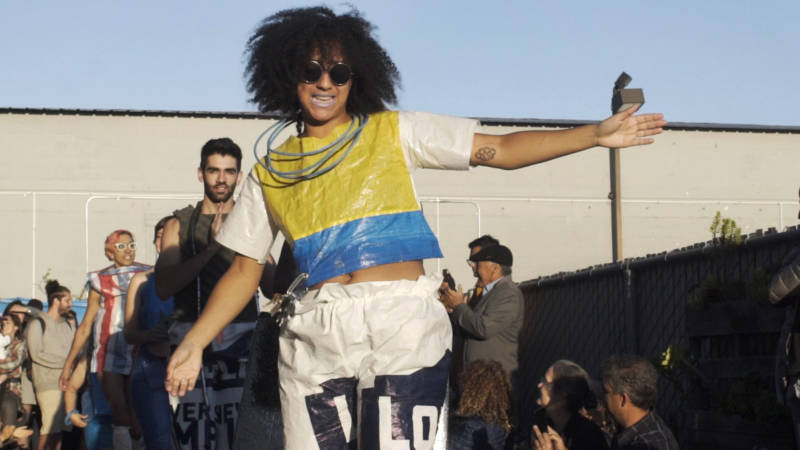Despite the extravagant, bombastic name, the members of Bonanza (the collaborative art practice of Conrad Guevara, Lindsay Tully and Lana Williams), aren’t as interested in occupying the spotlight as they are in creating opportunities for others to shine. “We’re a platform,” Tully says. “We will design or curate a situation, set up the scene.”
On a late September evening in 2018, that scene was a fashion show The Young and the Restless. Models powerfully stalked an actual platform—a 50-foot-long runway made out of recycled pallets—showing off dozens of looks sourced almost entirely from Recology San Francisco, the city’s public dump.
The show was the culmination of a four-month residency; the trio mined Recology’s public disposal area for unorthodox materials like Lowe’s shopping bags, a hammock, shaped foam and fake foliage, custom-fit their outfits to each model and coached their volunteers (fellow artists, members of the queer community and nightlife scene) in runway tactics. “We like to make people feel like we’re empowering them,” says Guevara. “We think of them as professional and their time is valuable.” That experience, in turn, can help people ask for what they want—and get it.

Jasmine Johnson, one of Bonanza’s models, can attest to this. “I’m usually not a performer,” she says. “Bonanza, I think, is the only group that could get me to do something like this. They always make you feel really positive, really confident. We’re walking like New York Fashion Week or something!”
Watching material arrive at Recology often took an emotional toll on the artists, reinforcing the importance of the space they were creating through fashion and performance. “You see a lot of things come from old homes in San Francisco,” Guevara says. “Like old patio furniture—and then old drywall with wallpaper. So you know someone is flipping a house to make it into a luxury home for a single family when maybe it was an apartment building for multiple families.”

